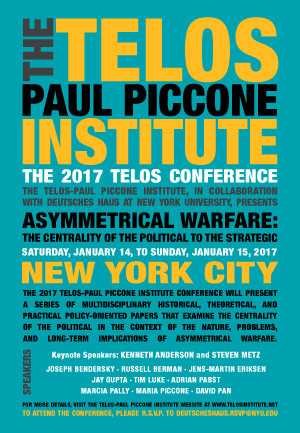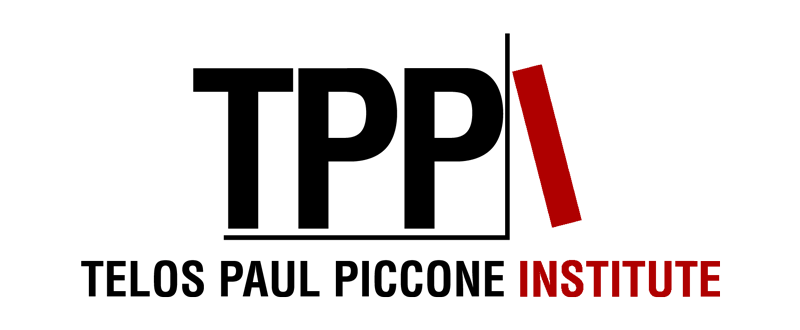The 2017 Telos-Paul Piccone Institute Conference
January 14–15, 2017
New York, NY
The Telos-Paul Piccone Institute, in collaboration with
Deutsches Haus at New York University, presents
Asymmetrical Warfare:
The Centrality of the Political to the Strategic
Organized by Joseph Bendersky, Virginia Commonwealth University
Dr. Steven Metz will deliver the keynote address “Future Conflict and the Conceptual Prison of Asymmetry.” Dr. Metz is Research Professor and Director of Research at the U.S. Army War College Strategic Studies Institute. He previously served on the faculty at the Air War College and the U.S. Army Command and General Staff College. Among his monographs are Iraq and the Evolution of American Strategy and Defining War for the 21st Century. His numerous articles have appeared in the Washington Quarterly, The National Interest, and Defense Studies.
View the conference program (PDF)
Conference videos
Conference papers posted at the Telos Press website
Conference Description
 Unconventional, nontraditional, or more precisely asymmetrical warfare has become the pervasive reality for the modern world. All realistic prognoses compellingly suggest it will remain so throughout the twenty-first century. The recent terrorist attacks in Paris and San Bernadino were no temporary aberration, or incidents of domestic political violence, but part of an increasingly normative pattern of asymmetrical warfare against the West. These events are inextricably related to the unconventional warfare and terrorism characterized by the conflicts extending from Afghanistan, Iraq, and Syria to Africa. Isis, al-Qaeda, and Boko Haram have become the common coinage of political discourse and news cycles. The controversy over the very terminology of the "War on Terror," like that over the Obama Administration's determination to close Guantanamo, illustrate the domestic as well as foreign policy implications of such developments. Meanwhile, Europe likewise faces both overt actions and indirect consequences of asymmetrical warfare. Russia's proxy war in Ukraine and annexation of the Crimea, together with the massive Middle Eastern refugee influx, has thrust Europe into its own highly divisive disputes over its very cultural essence, political will, and future unity.
Unconventional, nontraditional, or more precisely asymmetrical warfare has become the pervasive reality for the modern world. All realistic prognoses compellingly suggest it will remain so throughout the twenty-first century. The recent terrorist attacks in Paris and San Bernadino were no temporary aberration, or incidents of domestic political violence, but part of an increasingly normative pattern of asymmetrical warfare against the West. These events are inextricably related to the unconventional warfare and terrorism characterized by the conflicts extending from Afghanistan, Iraq, and Syria to Africa. Isis, al-Qaeda, and Boko Haram have become the common coinage of political discourse and news cycles. The controversy over the very terminology of the "War on Terror," like that over the Obama Administration's determination to close Guantanamo, illustrate the domestic as well as foreign policy implications of such developments. Meanwhile, Europe likewise faces both overt actions and indirect consequences of asymmetrical warfare. Russia's proxy war in Ukraine and annexation of the Crimea, together with the massive Middle Eastern refugee influx, has thrust Europe into its own highly divisive disputes over its very cultural essence, political will, and future unity.
Although current media and political discourse too often treat such asymmetrical warfare as a relatively new—even baffling—phenomenon, recent scholarship has clearly demonstrated it has been ubiquitous throughout history. Since the ancient world, organized states and empires have perpetually confronted perilous tribal and other forms of relentless unconventional attacks on their borders and internally. However, in Invisible Armies and other studies, Max Boot, at the Council on Foreign Relations, has emphasized the momentous qualitative transformation of asymmetrical warfare since the eighteenth century. Over the past two centuries rebels have, he argues, become more sophisticated by exploiting three main features of the modern world: "politics, propaganda, press." For these reasons, studies at think tanks such as the Rand Corporation and at various U.S. War Colleges have shown the necessity of refocusing the examination of asymmetrical warfare from technology as "strategy and solution" to "social science knowledge." Whether intentionally or not, this redirection in the study of asymmetrical warfare has once again highlighted the "centrality of politics," in stark contrast to traditional narrow technical studies of war and military affairs.
This necessary shift, emanating from non-academic institutions, has simultaneously exposed the deficiencies in the attitudes and approaches to war generally inherent in contemporary university humanities that supposedly would provide that very kind of knowledge essential to our understanding of asymmetrical warfare. Longstanding anti-military sentiments among humanities and social science faculties have resulted in the study of war being significantly diminished, banished to the periphery, or totally ignored. With few exceptions, universities have increasingly relinquished military and diplomatic scholarship and education to outside entities. Moreover, the prevalence of cultural studies in academia has too often also led to the neglect, underestimation, or denigration of the "political" at the very point that experts, within and outside the military, have identified the criticality of politics to grasping the intricacies of asymmetrical warfare. Recognition of the political dimension is particularly vital for modern democratic societies where war and the domestic political process are inextricably interconnected. Indeed, the success of the varied forms of asymmetrical warfare launched against the West depends upon a psychological strategy of manipulating public opinion and thereby political responses in the targeted countries.
The 2017 Telos-Paul Piccone Institute conference will examine the "centrality of the political" in the context of the nature, problems, and long-term implications of asymmetrical warfare. It will offer a multidisciplinary historical, theoretical, and practical policy-oriented exploration of the following topics:
- Historical precedents or antecedents of the political dimensions of asymmetrical warfare.
- Properly identifying the nature, objectives, and strategies of non-state actors in the qualitatively altered modern form of asymmetrical warfare.
- The domestic politics of war, including rational responses vs. cynical political manipulation of a real threat.
- Civilian vs military thinking on such nonconventional war.
- The role of media as valuable information source, creator of public opinion, and potentially manipulated political and psychological instrument.
- Psychological susceptibility and responses to propaganda or media manipulation.
- The dilemma of balancing the fundamental values of an open society with the necessity of security in the face of enemy exploitation of those values and freedoms.
- The legal, moral, and practical implications of civil liberties for terrorists and unconventional combatants.
- Acute dangers for affected minority communities of public responses to terror and governmental actions to counter real and perceived threats.
- The necessity vs. the obsolescence of approaching modern asymmetrical warfare in the context of traditional western "rules of war" or international law.
- The domestic political impact of dire humanitarian crises caused by war.
- Religion: as motivation in asymmetrical warfare; responses of religious institutions in targeted countries.
- Economics and costs of foreign wars and domestic counter-insurgency.
- Ecology: domestic responses to environmental devastation during war.
- Prisoners of war: legal and political aspects of regular combatants vs. non-conventional combatants.
- Women: as combatants, victims, and instruments of war (e.g., political rape, mass abductions).
Rather than focusing on the technical military dimensions of asymmetrical warfare, this conference will emphasize the reciprocal interrelationship of the political-societal and war. What this kind of warfare means for society and, in turn, how the socio-political affects the nature of, and responses to, such war at home and abroad. For counteracting such insidious threats involves not only knowledge of the enemy, but equally important an understanding of the domestic political factors that enemy seeks to exploit. The conference intends to broaden the scope of current academic discourse by drawing more attention among university faculties and students to this aspect of the problem, as well as provoking more intense debate on it. In this manner, it will contribute significantly to the education of current and future elites in public life, who will greatly affect public opinion on this subject and, in many cases, also shape policy on it. Conferences of this type likewise serve as a venue of general public education essential for citizens in a democratic society. It is crucial that the public becomes more cognizant of the innovative socio-political strategy employed in asymmetrical warfare that, in fact, has them as the primary target of such manipulation. Democratic citizens themselves must become more sophisticated in their understanding of this fundamental aspect of asymmetrical warfare. In the final analysis, their opinion and reactions will greatly affect media and governmental responses to such threats, thereby exercising a decisive influence on the success or failure of such strategies.
Conference Videos
Keynote Presentation by Steven Metz:
Future Conflict and the Conceptual Prison of Asymmetry
Moderated by Joseph W. Bendersky
Keynote Presentation by Kenneth Anderson:
Situating Asymmetrical Warfare among Forms of Emerging Conflict in the Post–New World Order World
Moderated by David Pan
